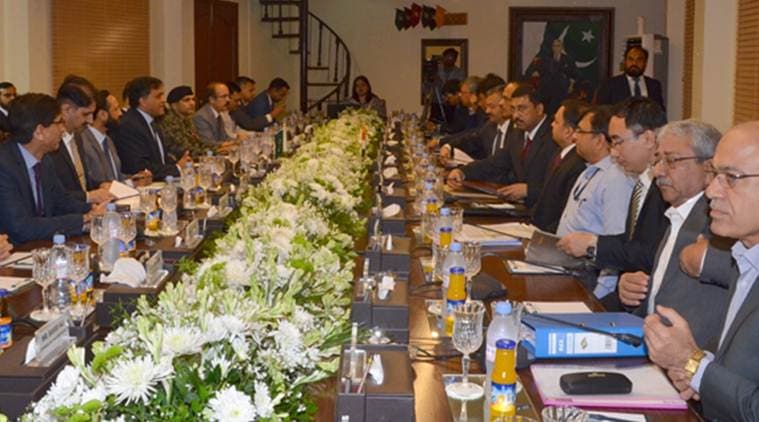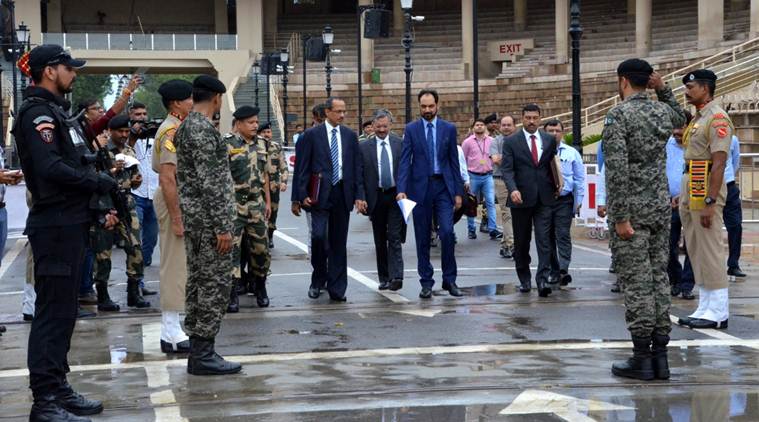
IN A major breakthrough, India and Pakistan have narrowed their differences on the proposed Kartarpur corridor with New Delhi Sunday stating that the two sides have agreed to allow visa-free travel for Indian passport and Overseas Citizenship of India (OCI) card holders on all days of the week.
The Indian government also said that 5,000 pilgrims will be allowed to visit the Kartarpur Sahib Gurdwara, near Lahore, per day. The pilgrims will be allowed to travel as individuals or in groups and also on foot, New Delhi said in a statement.
Pakistan also agreed, “in principle”, to build a bridge on its side to make the corridor immune to flooding and ensure an all-weather corridor to the gurdwara through the year. This had emerged as a key difference during the technical-level talks earlier. Differences, however, remained on the Indian proposal to allow 10,000 additional pilgrims to visit on special occasions.
According to India, Pakistan highlighted “infrastructural constraints” and conveyed that they may be able to accommodate many of the Indian proposals in a phased manner. To this, Pakistan was asked to “reconsider its position” as the corridor is a long-pending demand and there is expectation that it would be liberal in allowing more pilgrims and facilities.
There was also no clear agreement on the Indian proposal that there should be “no restrictions on the pilgrims in terms of their faith” — India’s statement referred to allowing Indian passport-holders, without referring to any particular faith.
While the two sides agreed that movement should be visa-free, there was no explicit reference to charging any fee or introducing any permit system by Pakistan.
Bilateral hope
After key differences emerged in March, the two sides have moved closer on major aspects, including a commitment by Pakistan to not allow anti-India activity by pro-Khalistan elements. Progress on Kartarpur provides a rare glimmer of bilateral hope.
India also raised the importance of ensuring a “safe and secure” environment for pilgrims and flagged concerns regarding individuals or organisations based in Pakistan “who may try to disrupt the pilgrimage and misuse the opportunity to play with the sentiments of the pilgrims”.
Kartarpur corridor: 54 immigration kiosks, seating for 2,000, on cards
The Indian side shared a dossier with Pakistan to highlight its concerns, indicating the presence of pro-Khalistan elements in the arrangement. “Pakistan side assured our delegation that no anti-India activity would be allowed,” the Indian statement said.
In this context, it was conveyed to Delhi that Pakistan has dropped pro-Khalistan leader Gopal Singh Chawla from the committee to oversee the corridor. Chawla was the secretary-general of the Pakistan Sikh Gurdwara Parbandhak Committee.

India had earlier conveyed strong concerns to Pakistan over his presence in a 10-member committee appointed by Islamabad on the project. Delhi had also forced the cancellation of the second round of talks, scheduled to be held in April, over the presence of Chawla in the committee. Chawla has been seen with Jamaat-ud-Dawa chief and 26/11 attack mastermind Hafiz Saeed in the past.
The Indian delegation Sunday also sought consular presence at the Kartarpur Sahib Gurdwara to be able to provide assistance to pilgrims. India said Pakistan also “agreed to look at” the issue of encroachment of land belonging to the gurdwara, which was raised earlier.
These were the key outcomes from the second round of talks between officials from both sides on the corridor, which was held at Wagah, Pakistan, Sunday.
While the Indian side was led by S C L Das, joint secretary in the Ministry of Home Affairs, Pakistan’s side was led by Mohammad Faisal, Director General (South Asia) in the Foreign Ministry who is also its spokesperson. In the first round in March, key differences had emerged between the two sides.
Addressing a press conference at the Integrated Check Post in Attari after the meeting, which lasted from 10 am to 1 pm, Das said: “Both sides have agreed to maintain a channel of communication and work towards finalisation of the agreement. The technical teams will meet again to ensure that seamless connectivity for the corridor is operational in time so that the pilgrimage can begin in November 2019.”

Das described the progress of talks as “significant” and “substantial”. “We have been able to narrow down the differences,” he said.
While there was no joint statement, Faisal said in Lahore that Pakistan and India agreed “80 per cent and beyond” on the draft agreement, with the remaining 20 per cent to be resolved in the next meeting. “There are positive developments,” he said.
Asked about a joint statement, Faisal said: “Until we agree on the final draft, we cannot share. On unresolved issues, we think we will have to have another sitting.”
The Indian statement said, “Progress was made in finalising the draft agreement with regard to the modalities.” On the bridge, it said: “Pending the construction of a bridge over the old Ravi creek by Pakistan on their territory, India offered to make interim arrangements for making the corridor operational in November 2019, given the historic importance of the 550th Birth Anniversary of Guru Nanak Dev Ji.”
The corridor will connect Darbar Sahib in Pakistan’s Kartarpur with Dera Baba Nanak shrine in Gurdaspur district and facilitate visa-free movement of Indian pilgrims to visit Kartarpur Sahib, which was established in 1522 by Sikh faith founder Guru Nanak Dev.
Apart from Das, the Indian delegation comprised representatives from the ministries of Home Affairs, External Affairs and Defence, the Punjab government and the National Highway Authority of India.
India said it has made “significant progress” to build state-of-the-art infrastructure, including a passenger terminal that can handle over 15,000 pilgrims in a day, which is targeted to be completed by October 31, 2019.
Work on a four-lane highway to the crossing point at the International Boundary is “progressing satisfactorily”, “on schedule” and will be completed by September-end 2019, it said.
The Pakistan side has been separately requested to permit and facilitate ‘Nagar Kirtan’ from Delhi to Nankana Sahib in Pakistan in July 2019 and again in October-November 2019.
Replying to a question on the number of Indian Sikh pilgrims who will be issued permits at the opening of the corridor in November, Faisal said: “It may be 5,000 or 8,000…This has to be decided.”
Faisal, who is also the Director General of South Asia and SAARC, said: “This is a corridor of peace and we have planted a sapling of peace.”